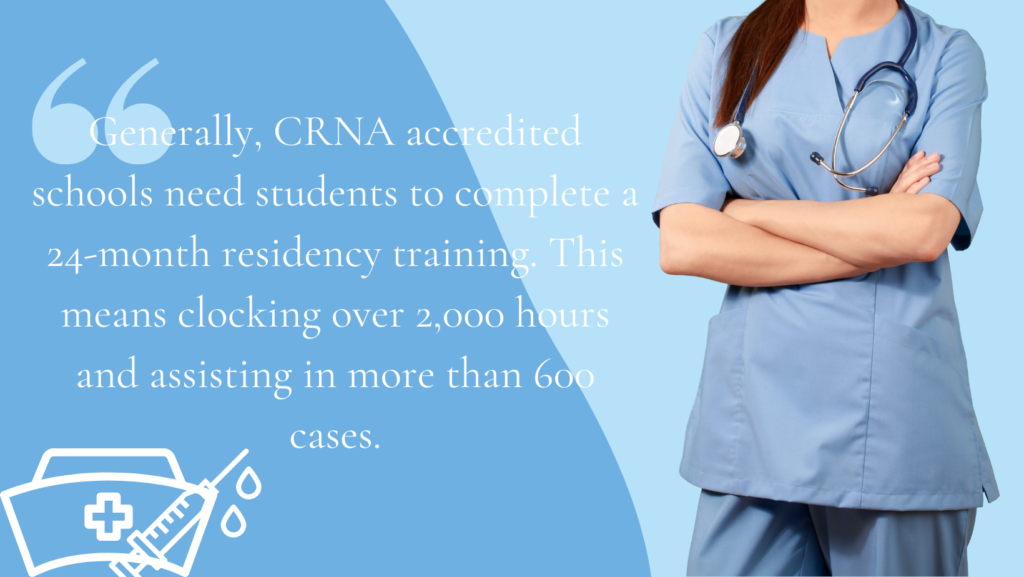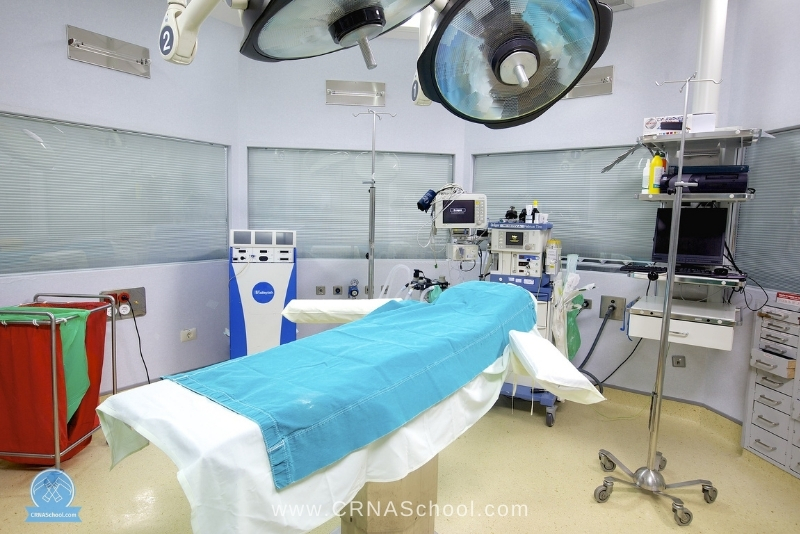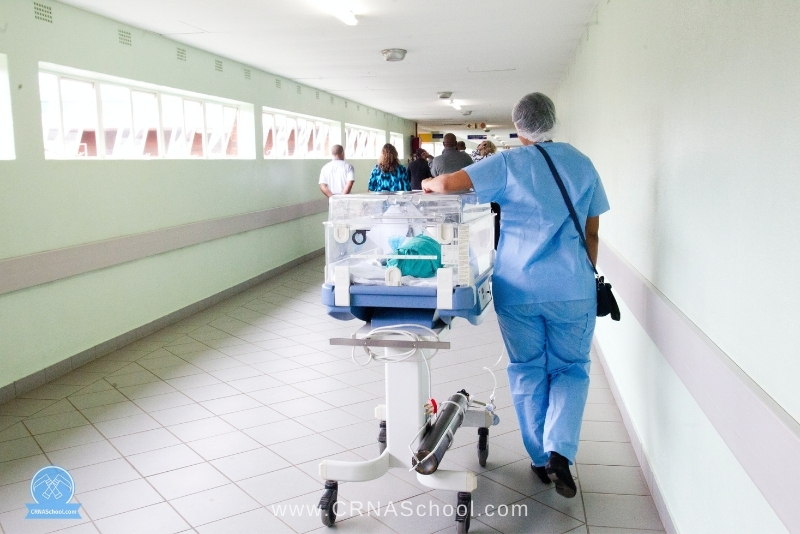Undergoing didactic and clinical OR time in nurse anesthesiology school helps prepare students for the professional life ahead.
Generally, CRNA accredited schools need students to complete a minimum of 24-month residency training. This means clocking over 2,000 hours and assisting in more than 600 cases.
Learn more about the nurse anesthetist training below.

Why is Residency Included in Nurse Anesthetist Certification Requirements?
Residency is included in Nurse Anesthetist Certification because it is a way to test the skills taught in CRNA accredited schools.
During this time, residents deal with different types of anesthesia and surgical procedures.
While residency is all about refining skills, it also requires good assessment. Critical thinking skills and sound judgment are imperative as well. After all, you will need to manage the client’s medical and psychosocial needs.
Do You Get Paid During CRNA Residency?
Unfortunately, nurse anesthetist residents don’t get paid for their service.
Unlike the physician workforce, there are no government funds for advanced nursing training.
Despite this setback, some institutions offer stipends to CRNA residents.

What You Need to Do as a Resident Nurse Anesthetist
Here are the things you have to do as a resident SRNA:
1. Room Set-up
Like any other day at work, preparation is important.
And as a CRNA resident, it all boils down to setting up an ideal operating room. This includes checking the anesthesia machine and drawing up the needed medications.
To avoid forgetting anything, remember the SAMMTIDE mnemonic:
- Suction
- Airway
- Machine
- Monitor
- Tape
- IV Fluid
- Drugs
- Equipment
2. Pre-operative Preparations
Now that the OR is set up, the next step is to assess the patient. It’s important to read through the patient’s history and medication intake. You also need to note previous reactions, laboratory results, and other pertinent information. Doing so will help you compute allowable blood, among many other things.
In essence, this assessment will help you create a comprehensive anesthesia plan. Additionally, it can prepare you for airway or bleeding problems.
As a resident, you need to refer your plan to the preceptor. This will ensure that all bases are entirely covered.
3. Anesthesia Induction
You need to take the initial vital signs and pre-oxygenate the patient.
After this, it’s time to induce anesthesia by giving any of the following medications:
- Propofol
- Fentanyl
- Rocuronium
- Lidocaine
Once the drugs kick in, the next step is to intubate the patient to insert an ET tube or laryngeal mask airway. With this, you can hook the patient to the machine and deliver the anesthetic gas.
Once the patient is under anesthesia, the surgeon can start with the procedure.

4. Finishing Up
After the surgery, it’s time to turn off the gas and wake the patient up. Once the patient regains consciousness, you can extubate and transfer them to the PACU.
CRNAs are not only involved in the intraoperative process but in post-op care as well. That said, it’s vital to watch the patient for a few minutes in the PACU. This will help ensure that the client is stable and comfortable.
Before you go back to the OR, remember to hand off your anesthetic report.

Preparing for Nurse Anesthesia School Clinical Residency
Even if you have excelled in online nurse anesthetist programs, residency is different. You can, however, prepare yourself by following these tips:
Come in prepared.
Read your books, notes, and lectures before going to the OR. Like preparing your machine, your mind should be sharp as well. Who knows? The anesthesiologist or the CRNA may ask you a question (or 12).
Take the initiative.
There will be times when there are not a lot of cases. Instead of doing nothing, observe other providers. Better yet, offer your help – even if it’s only pre-op interviews.
Know that not everything will be smooth-sailing.
Your first surgery may be perfect, and your second a disaster. While this may throw your confidence off, it’s a way for you to prove your abilities as a CRNA.
Be open to feedback.
“Taking constructive criticism from others is required to get to the next level.”
– Wendy Starland
While some may be disheartening, you should use these to improve yourself. Those who offer feedback have been dealing with anesthesia for years. Remember, it’s all part of the learning curve.
Be ready to deal with different personalities.
You will be working with a variety of people: doctors, licensed CRNAs, etc. Some will be helpful, and some will not. In any case, you need to be ready to interact with these personalities.
Be professional.
It’s better to be early than late. It’s essential to make a good impression with the people around you.
Don’t forget to say thank you to everybody who helped you in the OR.
What Happens after CRNA Residency?
After finishing residency and other CRNA school requirements comes graduation.
Once you’ve earned your degree, you may take the National Certification Examination (NCE).
The NBCRNA oversees this test. It’s also the last step you need to take to become a full-fledged CRNA.
The NCE aims to measure the knowledge, abilities, and skills required of a CRNA. You may take it for a maximum of 3 hours.
The exam consists of 70 content outline questions and 30 non-graded pretest questions. The maximum number of questions you can answer is 170.
NCE questions cover the following topics:
- Basic science
- Equipment & instrumentation
- General anesthesia principles
- Anesthesia for special procedures & populations and 30 random, non-graded pretest questions
The above-mentioned questions come in the following formats:
- Multiple correct responses
- Calculations
- Drag and drop
- Hotspot
- Graphics or video

National Certification Requirements for CRNA Professionals
To be eligible to take the NCE, you need to have:
- An unrestricted license as an RN and/or APRN
- Completed an accredited nurse anesthesia educational program within the last 2 years
Remember: it’s not enough to have CRNA qualifications and capabilities. You may be ineligible to take the test if you are:
- Diagnosed with any substance use disorder
- Decreed physically or mentally incompetent by a court or regulatory authority
- Documented with allegations of misconduct, malpractice, or unethical conduct
- Subjected to disciplinary action due to cheating or unethical behavior in school
- Convicted or pleaded no contest to a crime
The NBCRNA will provide the notice of eligibility 1 to 5 days after document submission.
Passing the test will make you a certified nurse anesthetist.
Final Words
Nurse anesthetist residency is a long 2-year path, but it’s worth it. It leads to your certification, after all.
While it is very challenging, it is an irreplaceable learning experience. What you learn from here will prove vital in your practice as a future CRNA.

